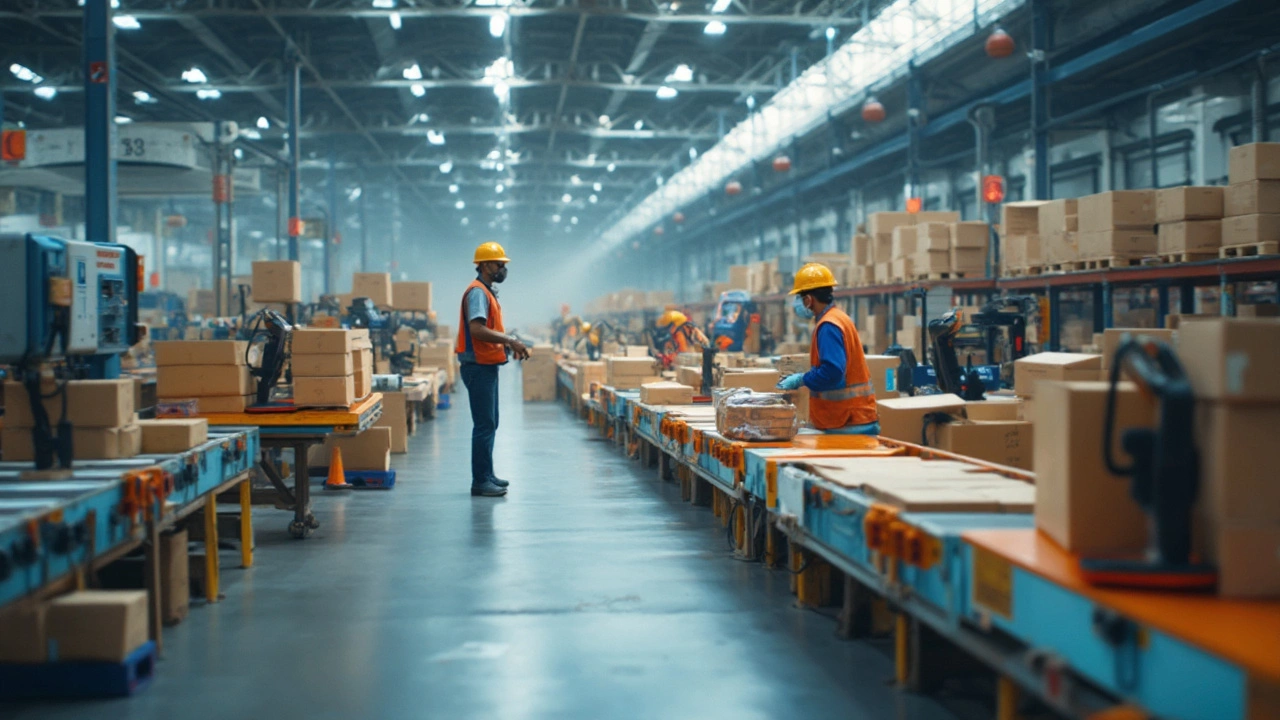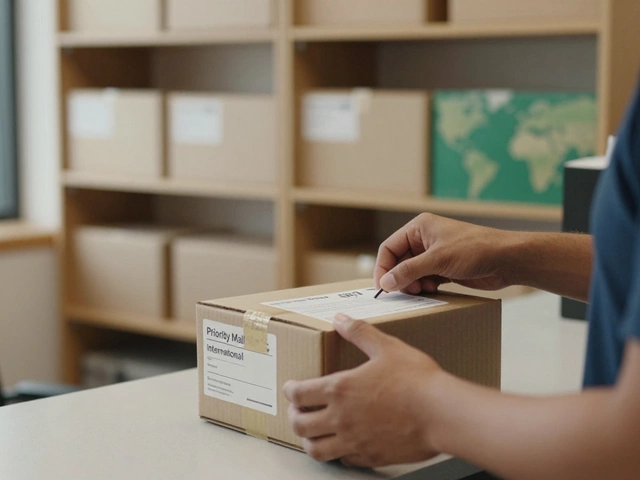Ever felt lost trying to choose the right logistics company? You’re not alone. Most people don’t realize how much money and time they can save with a partner who actually knows their stuff. It’s not just about moving boxes from point A to B. It’s about keeping your business running without surprises, making sure your customers get what they want, on time, every time.
So why should you consider hiring me for logistics? For starters, I know that one late delivery can mess up an entire project, sour your reputation, and lose you valuable clients. I've seen companies throw money at flashy tracking tools and still lose track of shipments because the basics weren't handled well. You need someone who gets the details right, who can spot a potential delay before it even happens, and who has done this—not just read about it.
Let’s talk simple facts: the best logistics companies get the job done quietly, so your business doesn’t skip a beat. When I manage your shipments, you’re not left guessing where your goods are or when they’ll arrive. You just know it’ll happen, and that peace of mind lets you focus on running your business instead of chasing lost pallets. Trust me, it’s a big deal once you’ve experienced it.
- Experience That Actually Delivers
- Tech That Makes Things Easier
- Cutting Costs Without Cutting Corners
- Solving Problems Fast
- Picking the Right Partner: Red Flags and Green Lights
Experience That Actually Delivers
When picking a logistics company, experience is what separates the real pros from everyone else. I’ve spent years in the field—no job is too small or too messy. From late-night truck breakdowns to last-minute customs hiccups, I’ve seen how things can go sideways and what it actually takes to fix them fast. You don’t want someone learning the ropes on your dime.
Let’s look at real numbers. The Council of Supply Chain Management Professionals reports that about 63% of logistics delays can be traced right back to human error or poor planning. That’s where hands-on know-how saves the day. It’s not just about moving stuff; it’s about getting the paperwork right, keeping drivers on schedule, and always having a backup plan for when the weather, traffic, or even political protests throw a wrench in your route.
Here’s what experience brings to the table:
- Knowing the tricks to speed up customs clearance (and how not to get dinged with surprise fees).
- A network of trusted drivers, warehouse teams, and freight forwarders so your supply chain doesn’t hit a wall if a single link fails.
- Quick decision-making in a crisis—no waiting for endless email replies when a shipment gets stuck.
- Efficiency in planning routes that actually save money on fuel and tolls.
- Preventing common slip-ups, like paperwork mistakes that can stall goods at the border for days.
Here’s some industry data that highlights just how much experience can impact your bottom line:
| Aspect | Experienced Logistics Company | Inexperienced Company |
|---|---|---|
| On-Time Delivery Rate | 97%+ | 84% |
| Error Rate (Shipments) | <1% | 7% |
| Customs Delays (Average Days) | 1.1 | 3.8 |
Why risk your reputation or waste money fixing mistakes after the fact? With someone who really gets logistics, you get fewer fires to put out—and more happy customers. The key is working with people who’ve already knuckled down through the tough lessons. That’s exactly what I bring to the table. A smooth operation starts with real experience, not just promises.
To put it simply, when you choose the right logistics companies, you’re buying peace of mind and real results, not just a service. That’s what experience delivers every time.
Tech That Makes Things Easier
You know how annoying it is when you order something and tracking just gives you the dreaded "in transit" for days? With the latest tech, there’s no more guessing games. You get real-time updates you can trust. A good logistics company uses tools like GPS tracking, digital inventory, and cloud-based dashboards. This isn't just cool—it saves you headaches and money.
Let’s break down a few of the main tools that really make a difference:
- GPS and Real-Time Tracking: Modern systems let you see exactly where your shipment is, even down to the street. If there’s a traffic jam or sudden weather mess, you’ll know—and so will your customers.
- Warehouse Automation: Robots and smart software keep warehouses running smoothly, so your products are picked, packed, and shipped faster with less room for mistakes. Amazon uses over 750,000 robots in their warehouses to cut down processing times.
- Integrated Communication: Forget endless emails and lost spreadsheets. Portals keep all your shipping info in one place and send you automatic updates, so you’re never left wondering if your order is still sitting on the dock.
- AI-Powered Route Planning: Artificial intelligence looks at weather, road conditions, fuel prices, and even holidays to choose the best route automatically. This can shave hours off delivery and reduce fuel costs.
Check out a few stats that matter if you’re thinking about how tech changes the game:
| Tech Used | How It Helps | Stat / Fact |
|---|---|---|
| Real-Time Tracking | Keeps you updated, less lost freight | Shippers who use it report 30% fewer missed deliveries |
| Warehouse Automation | Faster order processing | Cuts order-to-ship time by up to 50% |
| AI Route Planning | Cheaper and quicker shipments | Saves up to 15% in fuel costs |
Bottom line: if your logistics partner still tracks with pen and paper or relies on daily check-in calls, that’s a red flag. Upgraded tech isn’t a luxury anymore; it’s the standard for getting things done right and fast.

Cutting Costs Without Cutting Corners
Everybody wants to save money. But if you cut the wrong costs in logistics, you end up with late shipments, lost inventory, or even angry customers. Getting lean without losing quality is all about knowing where it actually makes sense to save—and where that penny-pinching just causes bigger headaches down the line.
A lot of people think hiring a big-name logistics company means things will just work. The truth is, those big players often charge hefty fees for brand alone, not better service. Going with a provider who understands real-world shipping can shave off extras like unnecessary storage charges, sneaky paperwork fees, and repeat shipments for stuff that got lost the first time around.
One trick is maximizing container space. For example, the Journal of Commerce shared that optimizing pallet stacking and consolidating loads can save up to 20% on shipping for small to mid-market companies. It's not rocket science—just paying attention to what you're really shipping and not sending half-empty trucks on pricey routes.
Here's where logistics companies like mine stand out:
- logistics companies with seasoned planning teams can slash wasted trips and deadhead miles.
- We use real-time data to spot cheaper routes or catch bottlenecks before your shipment gets stuck somewhere random.
- No hidden fees—what’s quoted is what you pay, not a stack of charges for fine-print mistakes.
- We work out smart deals with carriers, passing those savings to our clients instead of fattening our own wallet.
Not convinced it matters? Have a look at this quick breakdown:
| Expense Type | Paying Too Much (Bad Plan) | Efficient Logistics (Smart Plan) |
|---|---|---|
| Freight Charges | $2,500/shipment | $2,000/shipment |
| Storage Fees | $400/month | $150/month |
| Lost Inventory Cost | $800/quarter | $0/quarter |
| Paperwork Charges | $100/batch | $20/batch |
When you add that up over a year, it’s thousands back in your pocket. The trick is focusing on smarter planning, negotiations, and tech—never just cutting corners for a quick win.
Solving Problems Fast
Stuff goes wrong in logistics. That’s just reality. Trucks break down, shipments get delayed at customs, inventory numbers don’t match up. The difference between a smooth operation and chaos is how fast and smart you bounce back when things go sideways.
I’ve handled a freight container stuck at a border just days before a huge product launch. We didn’t wait for emails to float back and forth—we picked up the phone, called the customs agent, sorted the paperwork, and arranged a local courier for the last stretch. The goods arrived on time. That’s what moves the needle.
Real-time tools help, but people who know how to act quickly matter more. According to a 2023 survey by Transport Intelligence, over 60% of companies picked logistics partners based on fast problem-solving, not just cost. Your bottom line depends on quick action, not empty promises.
- Keep emergency contacts for drivers, customs agents, and warehouses handy. Don’t dig through old emails when there’s a missed delivery.
- Use logistics tracking apps, but confirm details with a real person if something looks off. Machines can miss things, humans see the patterns.
- Have backup plans. If the main route’s blocked, know your alternative before it’s needed.
Hiring someone for logistics companies who knows how to handle problems means you’re never the one left apologizing to customers. You get answers fast, not excuses.

Picking the Right Partner: Red Flags and Green Lights
If you're shopping for a logistics company, you’ll hear all sorts of promises. But how do you tell reliable from risky? Let's get straight to the warning signs and good signals you should watch for.
Logistics companies that really deliver results are open about how they work, admit mistakes, and fix problems fast. If someone dodges your questions, talks big but sweats the small stuff, or gives you half-baked answers about timelines, that’s your first red flag. Another one to look out for: outdated tech. In 2024, if a company still handles everything on Excel sheets or can't send real-time tracking updates, your deliveries are at risk.
Here’s the kind of stuff that should make you pause:
- They’re slow to give you quotes or answer questions.
- No clear point of contact—you don’t know who’s in charge if something goes wrong.
- Poor or unclear communication. If they can’t explain how your shipment moves from A to B, imagine when things get complicated.
- Hidden costs pop up all the time.
- The company’s reviews mention late deliveries, missing inventory, or rude support.
Now, signs you’re working with a winner? Easy. They get back to you fast, explain every step—including pricing—without jargon, and they offer technology that lets you track shipments in real time. Look for a simple dashboard, a quick way to reach real people, and references from businesses like yours. If they ask detailed questions about your needs instead of offering a cookie-cutter service, that’s a good green light.
Check their numbers, too. Here are some industry averages:
| Metric | Industry Average | Top Performers |
|---|---|---|
| On-Time Delivery Rate | 92% | 98%+ |
| Inventory Accuracy | 94% | 99%+ |
| Customer Support Response Time | 2 hours | 30 minutes |
Compare these with the company’s own numbers. If their stats are better than average and they’re honest about them, you’re on the right track.
The bottom line? Trust your gut, but back it up with data and real feedback. The right partner makes everything run smoother—and you’ll notice the difference from day one.





